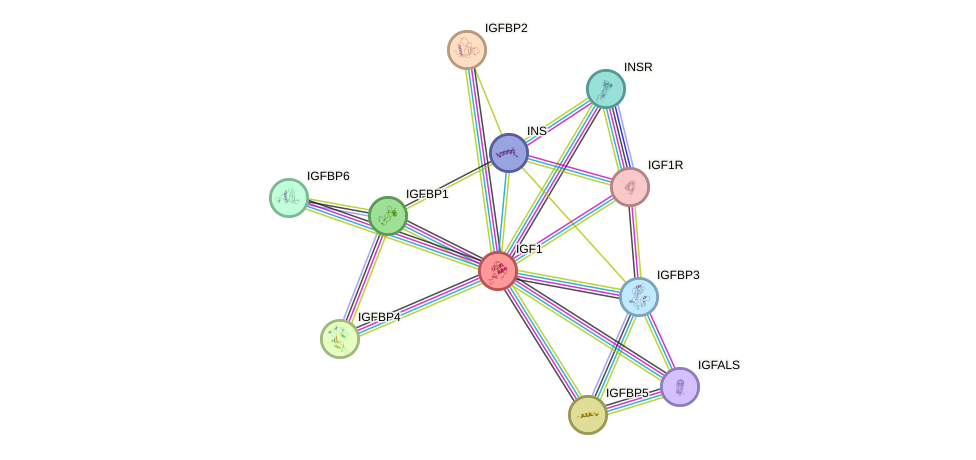GenAge entry for IGF1 (Homo sapiens)
Gene name (HAGRID: 28)
- HGNC symbol
- IGF1
- Aliases
- IGF1A; IGFI; IGF-I
- Common name
- insulin-like growth factor 1 (somatomedin C)
Potential relevance to the human ageing process
- Main reason for selection
- Entry selected based on evidence linking the gene product to a pathway or mechanism linked to ageing
- Description
IGF1 is a hormone that stimulates growth and mediates many of the actions of GH1. Like GH1, its circulating levels decline with age in humans. The GH1/IGFI axis is considered a possible player in the ageing process of several model organisms, including rodents [286] .
IGF1 null mice show growth deficiency and usually are not viable, though some can reach adulthood [965]. Mutations that lower IGF1 levels in mice retard growth and extend lifespan [287], even if a definitive causative relation between IGF1 and ageing has not been demonstrated. In another study, including three different mice cohorts, it was reported that IGF1-deficient mutants, producing reduced levels of IGF1, display an increase in maximum lifespan, but not in the mean lifespan [3528]. Cardiac specific overexpression of IGF1 results in a 23% increase in median lifespan, though no increase in maximum lifespan [1902]. IGF1 signalling appears to integrate nutrient and temperature homeostasis in mice [4502]. Contrastly, congenital liver IGF1-deficient male mice, have a reduced lifespan (by ~20%). Inducing hypertension in these mice leads to cerebral microhaemorrhages which mimic the ageing phenotype [4501]. Additionally, inducibly deleting the liver IGF1 gene at one year of age impairs health span. The mice display compromised skeletal integrity, decreased body, kidney and quadriceps weight, and an increase in liver weight, inflammation, oxidative stress and tumors [3556].
In humans, IGF1 levels have been associated with several pathologies. High levels of IGF1 have been found to be associated with risk of breast cancer [993]. On the other hand, low levels of IGF1 have been associated with osteoporosis [1923]. Genotype combinations in the human PIK3CB and IGF1R genes have been related to plasma IGF1 levels and longevity [141]. Low levels of IGF-1 in nonagenarians females (but not males), and both males and females with a history of cancer, predicts longer survival chances [3599]. Despite being a putative regulator of ageing, IGF1's exact influence on human ageing is not known.
Cytogenetic information
- Cytogenetic band
- 12q23.2
- Location
- 102,395,867 bp to 102,480,645 bp
- Orientation
- Minus strand
Protein information
- Gene Ontology
-
Process: GO:0000187; activation of MAPK activity
GO:0001501; skeletal system development
GO:0001775; cell activation
GO:0002576; platelet degranulation
GO:0006260; DNA replication
GO:0006928; movement of cell or subcellular component
GO:0007165; signal transduction
GO:0007265; Ras protein signal transduction
GO:0007517; muscle organ development
GO:0008283; cell proliferation
GO:0008284; positive regulation of cell proliferation
And 54 more GO terms Cellular component: GO:0005576; extracellular region
GO:0005615; extracellular space
GO:0005886; plasma membrane
GO:0016942; insulin-like growth factor binding protein complex
GO:0031093; platelet alpha granule lumen
GO:0035867; alphav-beta3 integrin-IGF-1-IGF1R complex
GO:0042567; insulin-like growth factor ternary complex
GO:0070382; exocytic vesicle
Show all GO termsFunction: GO:0005158; insulin receptor binding
GO:0005159; insulin-like growth factor receptor binding
GO:0005178; integrin binding
GO:0005179; hormone activity
GO:0005515; protein binding
GO:0008083; growth factor activity
Protein interactions and network
- Protein-protein interacting partners in GenAge
- IGF1R, E2F1, IGFBP3, IGFBP2
- STRING interaction network
Retrieve sequences for IGF1
Homologs in model organisms
In other databases
- GenAge model organism genes
- A homolog of this gene for Mus musculus is present as Igf1
- GenAge microarray genes
- This gene is present as IGF1
- LongevityMap
- This gene is present as IGF1


